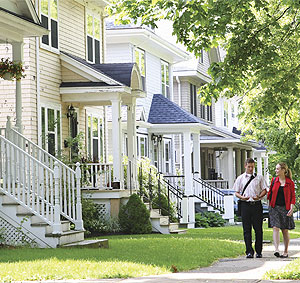 |
| One of the beautiful neighbourhoods in south-end Halifax. |
With an approximate student population of 50,000âor 14 per cent of the total populationâHalifax is something of an experiment in inter-generational cohabitation.
A large population of students concentrated in a small area can provide benefits, but also challenges. For ±«Óătv, it means finding creative solutions to the sometimes problematic dynamics of student and permanent resident relationships.Â
The year 2003 was an unusual time for most universities. As Grade 13 was phased out in Ontario, twice as many graduating high school students than usual entered the university system. With so many extra students arriving in Halifax (coupled with a hurricane that interrupted the school year and left many students idle), a simmering conflict between students and residents began boiling over.
âI think ±«Óătv has smartened up a lot since 2003,â says Beverley Miller, a south-end resident for nearly 30 years and a member of the Halifax Peninsula Neighbourhood Association. âThatâs when ±«Óătv finally sat up and accepted responsibility.â
Like other cities with a high student density, Halifax faces a number of challenges related to noise, littering, and general disorderly conduct. In response, ±«Óătv created the ±«Óătv University Community Committee (DUCC) five years ago, bringing together the university and members of the community to discuss these problems.
Operation Fallback
One of the ideas born from these discussions was Operation Fallback. The designated police patrol is a unique partnership â ±«Óătv pays for the police officers, while Halifax Regional police contributes a cruiser dedicated to neighbourhoods around the universities. The officers are able to provide targeted, consistent coverage of the area, and as a result, many residents feel the situation has improved.
But some still feel more can be done.
âIt seems to me thereâs a very lax attitude towards drinking,â says Jim Creighton, a local resident and rental property owner who rents to students. âI think people are leaving their residences intoxicated and going downtown to get even more intoxicated. The fact that this is tolerated⊠I think needs to be controlled.â
âSometimes I think orientation gets people off one the wrong foot,â adds Ms. Miller. âI can see itâs one way to make students feel at home, but it sets the mood.â
Calendar
So what else does ±«Óătv do? Along with Operation Fallback, the university distributes a calendar to both local students and residents with tips on how to be a good neighbor and practical information on when to put out the trash and the green cart.
±«Óătv feels overall the response to the calendar has been positive, and many members of the community agree.
âWeâve been focusing on education,â says Constable Mike Long, community liaison officer with the Halifax Regional Police. â(Students) remember the speeches and the pamphlets.â
Each year, officers attend frosh week and are invited to speak to residence students. Constable Long also feels that the continuous presence of the same police officers, who take the time to explain the reasons for writing tickets to the offending students, help to increase awareness of the consequences of their actions.
And, according to Const. Long, this is the quietest year Halifax has experienced in a long time.
âWord is getting out there that it wonât be tolerated to have big parties and walk around with open liquor.â He points to an increase in enforcement as opposed to multiple warnings as a reason for the increase in tickets this fall, while pointing out that noise complaints have actually decreased by 30 per cent since 2005.
Nonetheless, residents want to make it clear that when it comes to their homes and personal lives being disturbed, this is not just a case of âold folksâ lashing out unfairly at students. They point out that a large percentage of noise complaints, in fact, come from other students.
It is more to do, they say, with simple respect for the neighborhood. And that means cleaning up garbage instead of dumping it on lawns and refraining from shouting profanity late at night or in the presence of children.
Some feel the general upkeep of houses is a landlordâs responsibility and that those who rent to students must do more to enforce a standard of behavior while simultaneously providing a safe environment in which to live.
These issues and more are things people struggle with as they try to coexist in an area of Halifax many consider an ideal place to live.
âYou donât want to ask the police to fine your neighbours,â says Mr. Creighton. âIt causes conflict.â
Elizabeth Ryan, a local resident and member of the DUCC, agrees. Sheâd like to see more places on campus for students to enjoy themselves, thereby preventing the issues that arise from young people carousing in houses, on the streets, or in the downtown. She, like most other residents, also recognizes itâs a small minority of students causing problems. âI donât think most kids view this as a place they are passing through and it doesnât matter.â
âI want to be part of the community welcoming them,â she adds.
Winnipeg native Katelynn Northam is new to Halifax and lives off campus in the neighbourhood adjacent to ±«Óătv.
